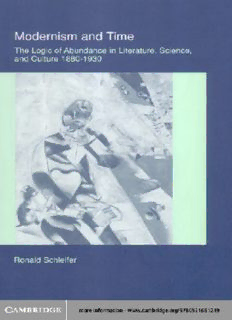
Modernism and Time: The Logic of Abundance in Literature, Science, and Culture, 1880-1930 PDF
Preview Modernism and Time: The Logic of Abundance in Literature, Science, and Culture, 1880-1930
This page intentionally left blank MODERNISM AND TIME In Modernism and Time, Ronald Schleifer analyzes the transition from the Enlightenment to post-Enlightenment ways of under- standing in Western thought. Schleifer argues that this transi- tioninthelatenineteenthcenturyandearlytwentiethexpresses itself centrally in an altered conception of temporality. He examines this period’s remarkable breaks with the past in literature,music,andtheartsmoregenerally.WhereasEnlight- enment thought sees time as a homogeneous, neutral medium, in which events and actions take place, post-Enlightenment thought sees time as discontinuous and inexorably bound up with both the subjects and events that seem to inhabit it. This fundamentalchangeofperception,Schleiferargues,takesplace across disciplines as different as physics, economics and philo- sophy. Schleifer’s study engages with the work of writers and thinkers as varied as George Eliot, Walter Benjamin, Einstein, and Russell, and offers a powerful reassessment of the politics andcultureofmodernism. ronald schleifer isProfessorofEnglishattheUniversityof Oklahoma. He is editor of the journal Genre and has published severalbooks,mostrecentlyasco-authorofCultureandCriticism: The Role of Critique in Modern Literary Theory (1991) and Culture and Cognition: The Boundaries of Literary and Scientific Inquiry (1992); Rhetoric and Death: The Language of Modernism and Postmodern DiscourseTheory(1990)iscloselyrelatedtoModernismandTime. MODERNISM AND TIME The Logic of Abundance in Literature, Science, and Culture, 1880–1930 RONALD SCHLEIFER Cambridge, New York, Melbourne, Madrid, Cape Town, Singapore, São Paulo Cambridge University Press The Edinburgh Building, Cambridge , United Kingdom Published in the United States of America by Cambridge University Press, New York www.cambridge.org Information on this title: www.cambridge.org/9780521661249 © Ronald Schleifer 2000 This book is in copyright. Subject to statutory exception and to the provision of relevant collective licensing agreements, no reproduction of any part may take place without the written permission of Cambridge University Press. First published in print format 2000 - ---- eBook (EBL) - --- eBook (EBL) - ---- hardback - --- hardback Cambridge University Press has no responsibility for the persistence or accuracy of s for external or third-party internet websites referred to in this book, and does not guarantee that any content on such websites is, or will remain, accurate or appropriate. for my father, Cy Schleifer Contents Preface page ix Introduction:Post-EnlightenmentModernismandthe experienceoftime 1 part i: post–enlightenment apprehensions 1 TheEnlightenment,abundance,andpostmodernity 35 2 Temporalallegories:GeorgeEliot,WalterBenjamin, andtheredemptionoftime 67 3 ThesecondIndustrialRevolution:history,knowledge, andsubjectivity 108 part ii: logics of abundance 4 Thenaturalhistoryoftime:mathematicsandmeaning inEinsteinandRussell 149 5 Analogyandexample:Heisenberg,linguisticnegation, andthelanguageofquantumphysics 184 6 Theglobalaestheticsofgenre:MikhailBakhtinandthe bordersofmodernity 208 Notes 233 References 255 Index 268 vii
Description: